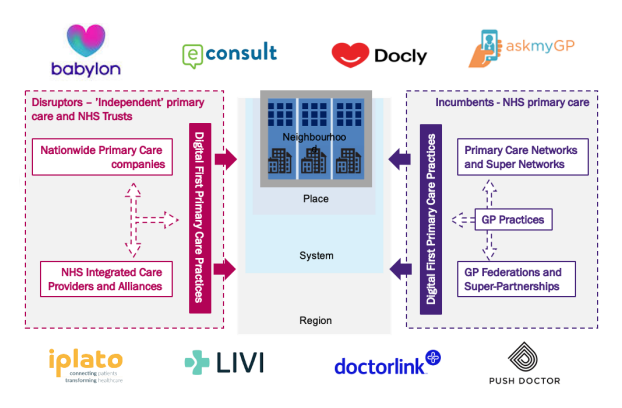Who will take the digital-first throne?

Plans to develop digital-first primary care are driving innovative partnerships between GP practices, NHS providers and technology suppliers. Conor Burke, Director of CPB Consulting, explores how a new competitive market is emerging.
Last year, the NHS Long Term Plan set out a vision to offer digital first primary care to all patients in England within 10 years. This includes new digital GP providers allowing patients the choice to register with them directly. The ambition is to provide straightforward access to primary care services, eliminate variation in the pathway of care, and help patients manage their own health better. This can potentially help address workforce shortages, particularly in under-doctored and deprived communities. Clinicians will have more time to focus on those with the greatest need.
In June 2019, NHS England and NHS Improvement (NHSE/I) undertook a public consultation on developing digital-first primary care – including the reform patient registration funding and contracting rules. These rules will help to ensure patients have both choice as well as access to integrated care.
In September 2019, NHSE/I published its response:
- NHSE/I intend to take forward the proposal for CCGs to disaggregate a practice list and award a new Alternative Primary Medical Services (APMS) contract when a (digital-first) practice registers over 1,000 patients from another CCG
- NHSE/I intend to create new opportunities in around 20-25 per cent of CCG areas which lack GP capacity and/or have poor patient access
- NHSE/I will develop a national assessment process and the criteria with commissioners and providers, to create a new national digital-first provider list in 2020/21
The consultation also found that there was support for a “partnership approach” to forming digital-first GP models. The response stated: ”We (NHSE/I) expect the approved providers list could include a range of partnership models. This may, in the first instance, include partnerships between NHS trusts or foundation trusts, whether acute or community, and digital providers.”
The statement also went on to outline that this plan could also include groups of GPs who want to set up their own new independent partnerships on a digital-first model. “We expect this route will provide a useful opportunity for people wishing to innovate in primary care,” the response stated.
“The ambition is to provide straightforward access to primary care services and eliminate variation in the pathway of care”
Conor Burke, Director of CPB Consulting
The merging market
We have started to see innovative partnerships between GP Practices, NHS providers and technology suppliers emerge, and some are positioning themselves in what is a new and increasingly competitive marketplace.

Above – A possible digital-first primary care market – disruptors vs. incumbents.
In August 2019 LIVI announced a collaboration with Our Health GP Partnership in Birmingham and Shropshire building on their existing partnership in North-West Surrey to bring digital GP access to over 1.85 million NHS patients.
In November 2019 a GP surgery in Newham, east London partnered with Docly to provide an online consultation service to avoid closing its practice as a result of most of its clinical staff going on maternity leave at the same time.
In January 2020 Babylon Health and the Royal Wolverhampton NHS Trust announced a 10-year partnership to develop a new model of digital first integrated healthcare – with services set to launch before the end of the year.
It is still early days in developing these partnerships with many variations yet to emerge. However, it looks increasingly possible that NHS trusts and primary care companies, such as Virgin Care and Totally Health, could partner with new digital suppliers as ‘disruptors’. These can then compete with ‘incumbent’ GP practices in the 20-25 per cent of CCG areas forming the initial digital-first market.
What will it mean?
How the market develops will very much depend on how ‘attractive’ the new digital-first specification and associated investment is to new entrants. How NHSE/I and local commissioners use the provider list to develop a market and encourage competition will also be a factor. However, assuming this happens both digital providers and GP practices will need clear strategies on how to respond to the emerging market.
Digital providers will need to give careful consideration who to partner with – whether to support existing GP practices, PCNs and Federations or look to collaborate with the larger NHS providers. It may be technically possible to partner and compete in both market segments – albeit in different CCG areas – however this potentially creates a tension between a supplier’s core value proposition and how it is authentically positioned.
“Digital providers will need to give careful consideration who to partner with”
Conor Burke, Director of CPB Consulting
The key decision for digital providers will be whether to position their offer as a tool to help existing GP practices deliver improved staff satisfaction and patient experience, thereby retaining their loyalty. Or do they partner with new entrants to help them quickly grow their business and register patients from local GP practices.
A full market analysis including payer priorities and challenges, along with local drivers, will be critical to the successful implementation of a supplier’s strategy.
The new market will be driven by patient choice and existing GP practices must not be complacent about the impact of this. They will need to consider carefully how to prevent the new entrants from ‘cherry picking’ their patients with exciting offers. Practices will need a robust approach to how they will compete with much larger and arguably more commercially mature organisations.
GPs have everything to lose and will need to really understand what service their patients want and then create the right offer to retain their loyalty. This will need to include a digital channel but also how they will provide a personal service and continuity of care.
They will also need to consider how they compete at scale which might include forming or further developing digital-first federated arrangements with other practices and PCNs. GP practices should develop a strategy for partnering effectively with digital providers.
Only by doing this can they identify and leverage their combined capabilities on where they can best serve patients and consumers. An effective strategy will help in identifying unmet needs, and discovering new and innovative ways of addressing them together that create additional value.
“GP Practices will need a robust approach to how they will compete with much larger and arguably more commercially mature organisations”
Conor Burke, Director of CPB Consulting
The first step is for Practices to identify the digital providers that they think they can best work with and that most closely align to their values and ambitions.
Then together the GPs, Practices and providers will need to determine if they have the right leadership, systems and processes, staff competencies and culture to become the most effective partnership of choice.
Conor Burke is Managing Director of CPB Healthcare Consulting. CPB work with companies to help shape your offer, position it with healthcare buyers and create the right relationships and partnerships to secure more business.
conor.burke@cpbconsulting.co.uk
+44 20 3332 2424
